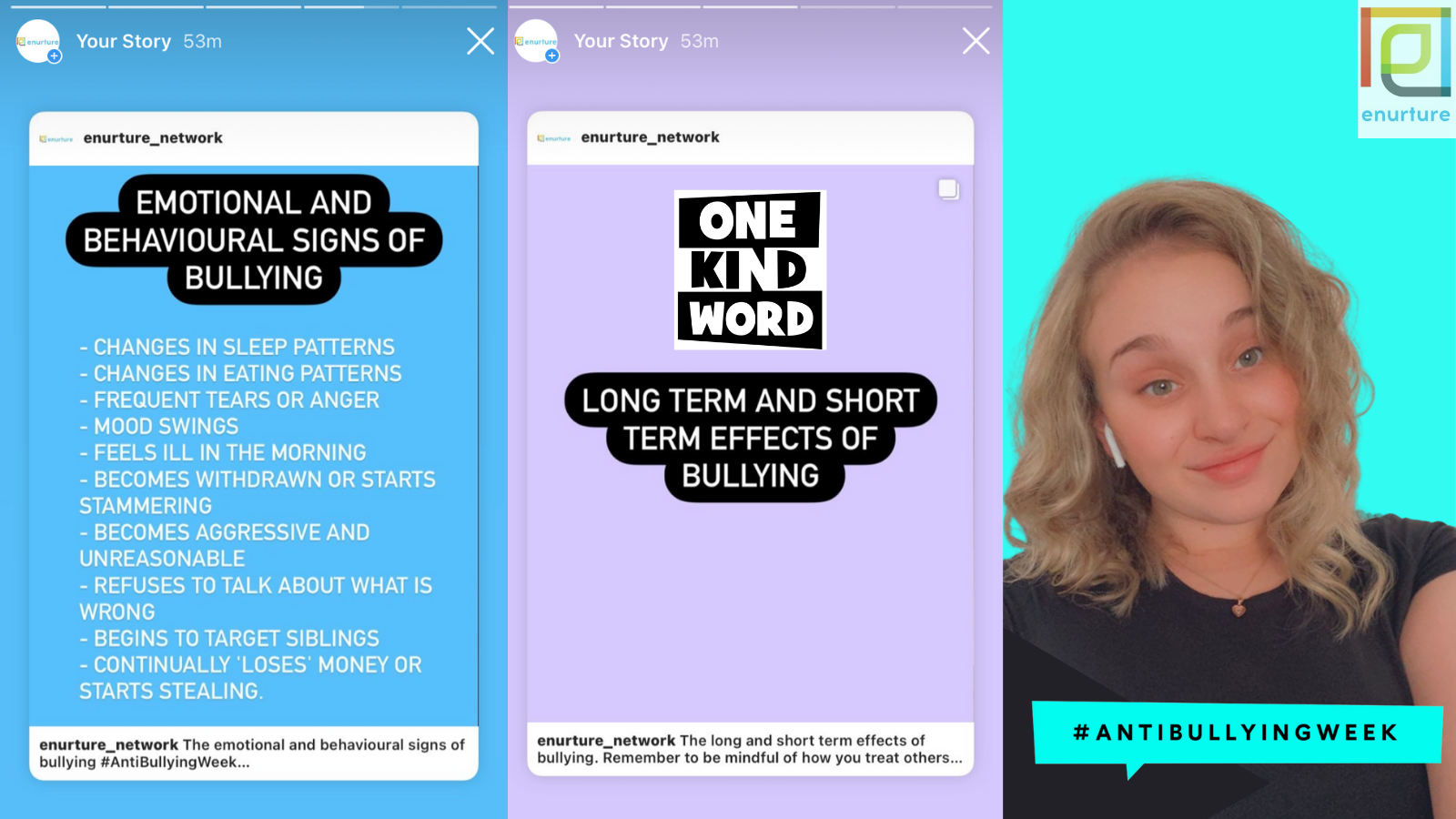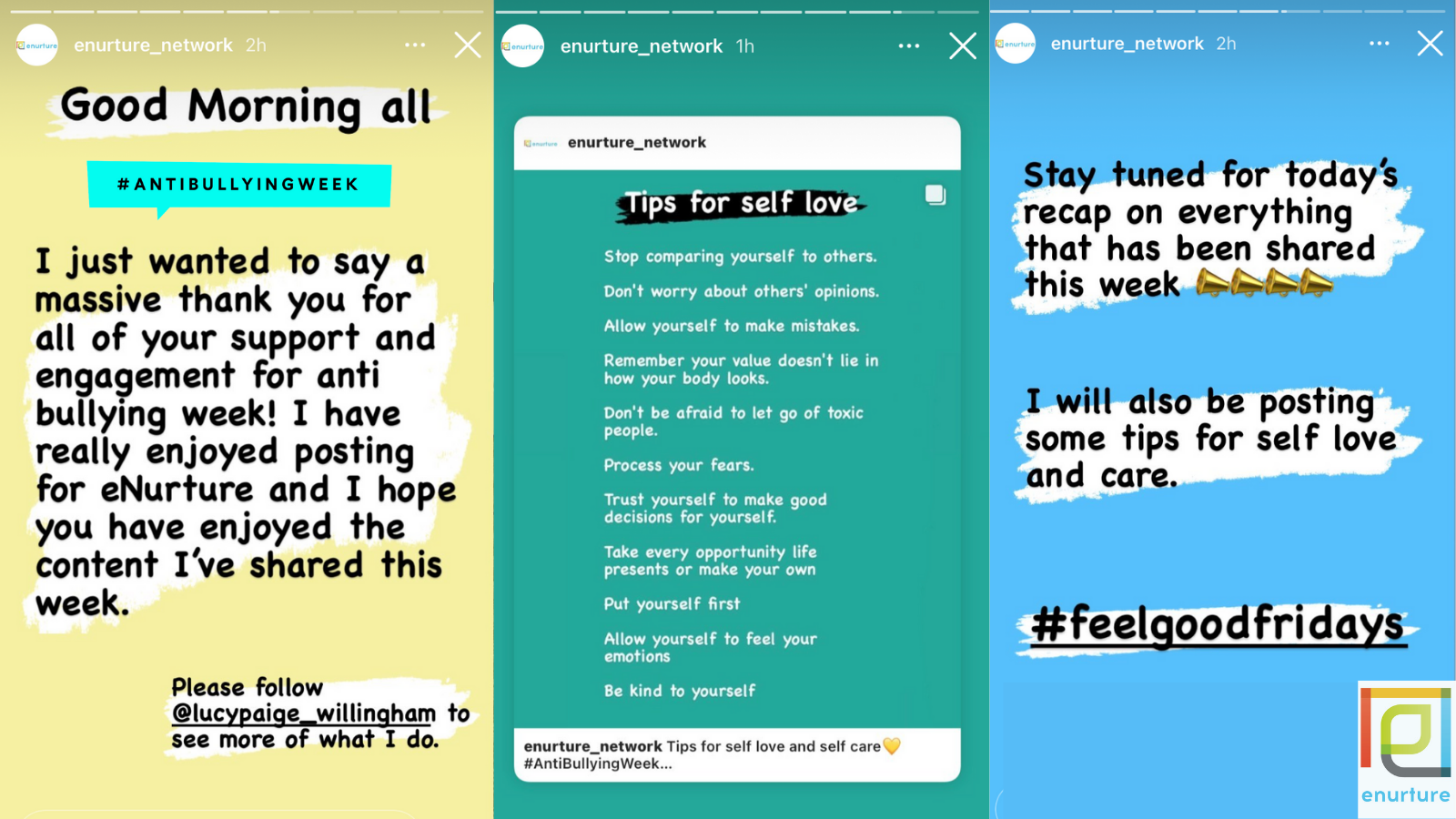Top tips for young people on bullying, peer pressure and self-care
What is bullying? By definition:
“Bullying is the repetitive, intentional hurting, of one group or person, by another group or person, where the relationship involves an imbalance of power. It can be face to face or online.”
Over the course of my eNurture Instagram takeover for the Anti-Bullying Alliance’s Anti-Bullying Week (15-19 November), I carried out some research on statistics, resources and tips surrounding bullying. I found that 1 in every 4 young people have been victims of bullying in the last 12 months, whereby 77% of those being bullied said that it had negatively impacted their mental health. From these worrying statistics, it was clear that the aim of my takeover was to inform young people of the significance of bullying and identify some key points which are usually overlooked. For example, the impact of peer pressure was one of the topics I discussed.
Peer Pressure
Peer pressure is a recognised form of bullying and is sometimes overlooked as it usually comes from an established relationship of trust. Bullying can happen in friendships too, so you should never give in to something you do not want to do or feel comfortable with doing. If someone is pressuring you to do it then recognise this as bullying. You are your own person, and you have every right to choose what you do without the pressure from other people influencing your decisions.
Peer pressure and sex
I believed this to be a crucial topic which is not openly discussed enough, and therefore needed to be addressed in light of the week's theme of anti-bullying. I had outlined how Peer pressure when related to sex is not ok and you should never do anything you do not feel comfortable doing. I went on to discuss:
It is ok if you do not want to have sex.
It is ok if you are not ready for sex.
It is ok to say no.
You do not have to do anything you are not comfortable with even if it is with a partner.
Your obligations are to yourself, always.
I went on to identify the emotional and behavioural signs of bullying, which include:
Changes in sleep patterns.
Changes in eating patterns.
Frequent tears or anger.
Mood swings.
Feeling ill in the morning.
·Becoming withdrawn or starts stammering.
Becoming aggressive and/or unreasonable.
Refusing to talk about what is wrong. Begins to target siblings.
Continually ‘loses’ money or starts stealing.
I felt that identifying these signs would be helpful to friends and family members to help recognise the changes in someone they care about to raise the question of whether they are experiencing bullying.
Furthermore, during my takeover I highlighted the short-term and long-term effects of bullying to demonstrate the significance of bullying and how it should not be taken lightly. Bullying has a tremendous effect on individuals, especially on their mental wellbeing.
Short term effects of bullying
Social isolation.
Feelings of shame.
Sleep disturbance.
Changes in eating habits.
Low self-esteem.
School avoidance.
Symptoms of anxiety.
Bedwetting.
Higher risk of illness.
Psychosomatic symptoms (stomach aches, headaches, other physical complaints with no known medical cause.)
Poor school performance.
Symptoms of depression.
Long term effects of bullying
Chronic depression.
Increased risk of suicidal thoughts, suicide plans and suicide attempts.
Anxiety disorders.
Post-traumatic stress disorder.
Poor general health.
Self-destructive behaviour (Including self-harm).
Substance abuse.
Difficulty establishing trusting reciprocal friendships and relationships.
Lastly, I want to discuss in this blog some tips for self-love and self-care as well as helplines. After discussing the impact of bullying, it is important to highlight ways to improve your mental-wellbeing to improve issues with self-esteem, anxiety, insecurities, sleep, feeling isolated/ isolating yourself and low moods.
Self-Love
Stop comparing yourself to others.
Do not worry about others' opinions.
Allow yourself to make mistakes.
Remember your value is not determined by how your body looks.
Don’t be afraid to let go of toxic people.
Process your fears.
Trust yourself to make good decisions for yourself.
Take every opportunity life presents or make your own.
Put yourself first.
Allow yourself to feel your emotions.
Be kind to yourself.
Physical Self-Care
Eat a healthy meal.
Engage in exercise.
Go for a walk.
Drink water.
Practice good sleep hygiene.
Have a cup of tea/coffee/hot chocolate.
Sit in the sunlight.
Take a shower or bath.
Indulge in what makes you happy.
Mental Self-Care
Practice mindfulness.
Take a break.
Play games.
Listen to music.
Read a book.
Listen to a podcast.
Watch a new Netflix show.
Reflect on things you are grateful for.
Call/text a friend.
Connect with nature.
Meditate.
Some useful helplines and resources
NSPCC
Helpline: 0808 8005000
18 or under: 0800 1111
Email: [email protected]
Website
School Resources
Childline
Helpline: 0800 1111
1-2-1 counselling chat online (7:30am - 3:30am)
Email from “Your Locker” by signing up at their website
Website
Internet Matters
Helpline: 0808 8002222
Email: [email protected]
Website
Papyrus
HOPELINEUK 0800 068 4141
Text: 07860 039 967
Email: [email protected]
Website
Young Minds
Parents helpline: 0808 8025544
Crisis Manager: Text ‘YM’ to 85258
Website
Anti-Bullying Alliance
Cyberbullying: why teachers need more support to tackle this insidious threat
Bullying UK
Useful resources on cyberbullying and how to stay safe online
Kidscape
Dealing with cyberbullying
UNICEF
How to stop cyberbullying
Diana Award: Anti-Bullying Pro
What to Do if You’re Experiencing Racist Cyberbullying Behaviour
I hope this information was helpful and do check out eNurture’s website and Instagram account for more resources, advice and guidance.
Lucy-Paige Willingham
eNurture Youth Panel Member
@Lucy_Paige_Willingham [Instagram]
@Lucywillingham8 [Twitter]
@Lucy-Paige Willingham [LinkedIn]












